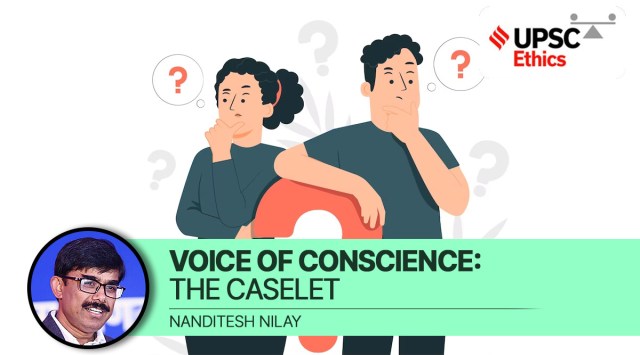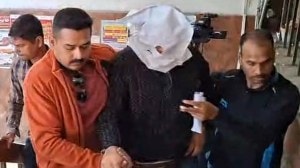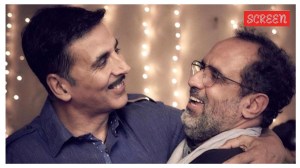UPSC Ethics Simplified — Voice of Conscience : the caselet
Caught between his duty and his mentor, will the voice of conscience help the SSP? Nanditesh Nilay takes us to a situation that a future bureaucrat may face in his tenure too.
 Nanditesh Nilay's caselet will help students in situation of ethical dilemma. (Image credit: Abhishek Mitra)
Nanditesh Nilay's caselet will help students in situation of ethical dilemma. (Image credit: Abhishek Mitra) 🚨 This story is part of our special initiative for UPSC and other competitive exams. Look out for UPSC KEY and UPSC Essentials on weekdays, Weekly news express with MCQs, Key Terms of the past week, Quizzes as well as The Indian Express 360° Upsc Debate, Society & Social Justice, UPSC Mains Practice, Art and Culture with Devdutt Pattanaik, UPSC Ethics Simplified, Experts Talk, and more. 🚨
Caught between his duty and his mentor, what will be the SSP’s course of action? Nanditesh Nilay takes us to a situation that a future bureaucrat may face in his tenure often. Will the voice of conscience help? Let’s find out…
UPSC Ethics Simplified takes you to one such situation in the form of a caselet. This caselet is an extension of the concept discussed on May 28 (The voice of conscience — the caselet). It is advisable to revisit the concept article before reading the caselet below.
Relevance: The topic is a part of UPSC CSE General Studies Paper-IV Ethics syllabus. Caselets are particularly relevant in the Case Study section. Aspirants will also find the article useful for their Essay paper and situation-based questions in personality tests.
Moreover, the essence of the article will help aspirants in their professional lives or in life in general. Nanditesh Nilay writes for UPSC Ethics Simplified fortnightly on Sundays. The first article will be a concept while the second article will be a caselet based on the concept. Don’t miss the Post Read Questions and Express Inputs below.
THE CASELET
He was upset. And why not? As a SSP he was supposed to enter with the force inside the campus of the college from where he graduated. There was a tense environment in that area. It was university elections and two leading groups were competing with each other. Even other groups were trying to communalize the situation as well.
As a SSP, he was thinking about those days when he used to participate in those elections with a lot of emotions. All of a sudden, his subordinate informed him about violent clashes inside the campus. He moved fast with his team and after half an hour the police force was inside the campus. One of the students shouted, “Sir, I am the son of Professor Sharma. Please, sir. I have not done anything. My college friends had asked me to terrorise and threaten the other group as I am a local and from another community as well. I’m trapped, sir. I am trapped!” In the meantime, students began pelting stones at SSP and his team. His team was asking for a green signal for Lathi Charge, but the SSP was in a fix. He remembered his professor’s words, “It is not a religion but humanity and values that matter. It is easy to use force in adverse situations. Still, we should believe in nonviolence. A lot of times while using force we become blind and cruel and hit a few innocents too. Always restrain and use force as the last option. The world can only be saved by nonviolence and peace.”
After a while, the boy and his team were taken into custody. A lot of students got hurt. Other students were yelling at that boy and targeting him as the main provocator of violence. SSP was around a lot of noise. The moment he was entering his vehicle, someone shouted from behind, “SSP sir. I am Professor Sharma. He is my son and has not made any mistakes. Do you think avoiding this foolish behaviour is easy in a college environment? He is not a novice but neither unethical too. Please SSP sir, please don’t take him to the police station. Even other children are simply misguided.” Professor Sharma was not able to see the face of SSP due to the helmet, but SSP was able to see his professor. The person who was an inspiration to him. A mentor, a coach, an apostle of values …
Post Read Questions:
(a) What are the ethical issues involved?
(b) What can you say about SSP’s personality?
(c) Where is Professor Sharma on the scale of ethics?
(d) What should SSP do? Justify.
EXPRESS INPUT
Thought Process
Why is it a major question on the conscience? Why is ‘Duty’ vs ‘Self’ a key element here causing dilemma? Is it fine for SSP to trust his mentor, Professor Sharma? Remember conscience becomes important when you are in an ethical dilemma but it can’t be unethical and wise. It is a challenge for SSP but it surely has a way, isn’t it?
1. Begin with identifying the problem of an ethical dilemma. List down the sentences which indicate it (for framing your arguments).
2. Ask yourselves the two opposing steps and mark the pros and cons.
| SSP’s Action | + Points | – Points |
| Listening to his professor and acting accordingly. | ||
| Listening to his voice of conscience |
Obviously, we know the answer! But justification is important based on ethics. Link it to ‘Emotional Intelligence’, if you need more fodder for your answer.
In the case of Professor Sharma: Think of him from the perspective of a father, teacher and citizen. Analyse him in all three roles. It might help!
Points to ponder
The following points may help:
Conscience is a kind of faculty which is unvarying, innate, and incorruptible and it is present in all human beings. In other words, conscience is the true self of human beings and a Kindle of guidance. It is a dependable source and it carries a voice. When someone feels that sermon, recommendation, or exhortation from one’s conscience, it is referred to as the voice of conscience.
What is the challenge and how to listen to the voice of conscience?
The challenge is the noise around us. The noise of confusion, ignorance, beliefs, notions, power, dogmas, upbringing, pressure, and other temptations. And in the midst of that noise, one will have to learn to heed to the voice of conscience. For listening to that voice in the middle of that noise of darkness one needs that input of human values and ethical competence. That ability to investigate that noise will prepare a mortal to listen to the voice, the voice of conscience.
So how to listen to that voice of conscience? It will take efforts to clear the noises. And for a bureaucrat who is always guided by rules and public benefit, one needs a sincere conditioning as well as practice to heed to the voice of conscience clearly. Here apart from family upbringing, we have to continuously train ourselves to seek guidance from within while making any decision. Is it possible? Why not? In a materialistic world there is a lot of noise and surprisingly we all keep a keen ear to those echoes. But an acute focus of self on the self will construct and evolve a person to reach nearer to that spirited self for listening to that voice of conscience.
So when a person carries a spirited urge for the truth, for the righteousness in conduct one can approach one’s conscience more and more clearly.
We need some time to introspect, contemplate and evaluate our behaviour, our actions and here our conscience will keep on guiding us provided we are seeking for that faculty. Great Vivekananda or Mahatma Gandhi are towering leaders who carry those soulful ears to listen to the voice of conscience in the midst of noises.
JUST FYI
Many of the above points may help you in the introduction, conclusion, or justification.
BTW, JUST CHECKING
1. Each time there is a demand for the resignation of the Railway Minister on grounds of “moral responsibility” and conscience after an accident, the example of which former Prime Minister is always quoted?
2. Why did a Bihar teacher returned his 33-month salary to college?
Not sure? Refer to the following articles:
After every railway tragedy, the burden of Shastri’s ‘moral responsibility
Get Inspired: What Shastri’s life teaches us about leadership and ethics?
UPSC Ethics Simplified | Voice of Conscience — the concept
— Edited by Manas Srivastava
The writer is the author of ‘Being Good and Aaiye, Insaan Banaen’. He teaches courses on and offers training in ethics, values and behaviour. He has been the expert/consultant to UPSC, SAARC countries, Civil services Academy, National Centre for Good Governance, Central Bureau of Investigation (CBI), Competition Commission of India (CCI), etc. He has PhD in two disciplines and has been a Doctoral Fellow in Gandhian Studies from ICSSR. His second PhD is from IIT Delhi on Ethical Decision Making among Indian Bureaucrats. He writes for the UPSC Ethics Simplified (Concepts and Caselets) fortnightly.
Share your views, answers and suggestions in the comment box or at manas.srivastava@indianexpress.com
UPSC Magazine

Read UPSC Magazine
- 01
- 02
- 03
- 04
- 05































